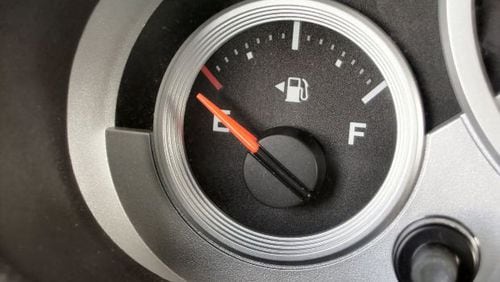For tens of thousands of drivers poised to start their Labor Day weekend drives, the price of transportation has jumped and is likely to keep rising.
With 10 Gulf Coast refineries out of commission and Colonial Pipeline's two crucial conduits pumping little if any fuel, Atlanta area gas prices have spiked an average of 45 cents per gallon in the past 12 days, according to AtlantaGasPrices.
The average price of regular gas in metro Atlanta late Friday was $2.69 a gallon, with area stations charging from $2.19 to $3.09.
Most of the jump has come since Sunday. The price is likely to rise 10 to 20 cents per gallon before hitting a peak, according to AAA, the Auto Club Group.
Some of that is just bad timing: besides the closed Texas refineries and the storm hitting Louisiana is the surge in demand that comes with millions of Americans taking to the roads for the holiday weekend.
“Consumers should expect to see the highest Labor Day prices at the pump since 2014,” said Josh Carrasco, a spokesperson for AAA.
The good news is that the bad news will not last, he said. “AAA does not expect Gulf refineries to be offline for months.”
And once they start producing fuel – probably toward the end of the month – prices should drop steadily.
One good sign from the markets: the wholesale price of gasoline has apparently peaked and has started to dip, according to Patrick DeHaan, a senior industry analyst at Gas Buddy.
That will eventually filter through to the pump – that is if the refineries start to come back online in the next few days. But the port, where tankers unload oil, is also crucial, he said. “Nothing improves until the Houston ship channel opens 100 percent, then relief in days,” he tweeted Friday.
Colonial Pipeline, which provides the lion's share of fuel to metro Atlanta and points north, Wednesday announced it was virtually shutting down its two pipelines. With that news, the price hike accelerated. At week's end, the Colonial system was operating, except for Texas – the location of half the refineries that feed the pipeline.
But the company is still expecting to restart fuel flow from the Houston area, officials said late Friday.
Some of the gas price increase has been propelled by changes in behavior – by drivers and retailers alike, said economist Tom Smith of Emory’s Goizueta Business School. “Everybody is being very forward-looking.”
In normal times, many drivers won’t fill up their tank until they have just a quarter tank of gas or less. But this is not a normal situation.
“Right now there’s plenty of gas, but you think there won’t be as much next week. So you fill up now.”
For the overall economy and most consumers, a relatively brief price increase is a manageable irritant, but for people living close to the edge of their income, a price spike is a problem.
For instance, Smith’s mother in law, Sharon Wikel of Johns Creek.
Wikel, 72, is retired and relies mostly on Security Security payments, she said. “When the price of gas goes up, I can’t go as far. So the economic impact affects me a lot.”
About the Author







